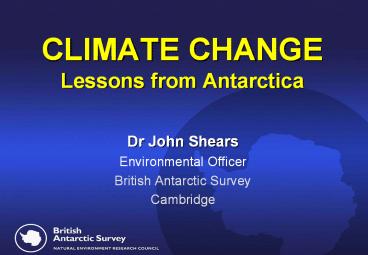CLIMATE CHANGE Lessons from Antarctica PowerPoint PPT Presentation
1 / 10
Title: CLIMATE CHANGE Lessons from Antarctica
1
CLIMATE CHANGELessons from Antarctica
- Dr John Shears
- Environmental Officer
- British Antarctic Survey
- Cambridge
2
Aims of the talk
- The Antarctic climate
- Current climate change in Antarctica
- Ice cores a unique record of past climate
- The impact of climate change in the UK
- Conclusions
3
The Antarctic climate
- Antarctica is the coldest continent.
- Significant variations in climate between various
locations. - Climate influenced by latitude, altitude, the ice
sheet, the Southern Ocean, and seasonal changes
in sea ice cover. - Todays temperatures
- 0.4o C Rothera
- - 32.9o C South Pole
4
Current climate change in Antarctica
- The Antarctic Peninsula has warmed by 3oC over
the last 50 years. - This has caused the collapse of several ice
shelves. Larsen B disintegrated in March 2002
releasing over 500 billion tonnes of ice.
Top. NASA Terra satellite image showing the
collapse of Larsen B ice shelf. Image is 300 x
300 km. Left. Aerial photograph of Larsen B.
5
Ice cores a unique climate record
- Ice cores contain a unique record of past climate
over thousands of years. - Scientists analyse pockets of air trapped in the
layers of ice. - BAS plays a leading international role in this
vital research.
6
CO2 levels over the last 400,000 years
Source Dr Anna Jones (2003), British Antarctic
Survey.
7
Present day CO2 levels
CO2 levels at South Pole are over 370 ppm.
- Over the past 100 years there has been a massive
and rapid rise in global carbon dioxide levels. - This is due to the increased burning of forests
and fossil fuels. - At about 372 ppm, todays carbon dioxide level is
higher than at any time in at least the past
400,000 years.
8
UK climate change Thames barrier
Number of closures per year of the Thames
barrier. Source DEFRA, 2003.
- The Thames Barrier protects London from flooding.
- It was used once a year in the 1980s. Now it is
raised more than six times a year. - A clear measure of increasing flood levels in the
River Thames and storm surges in the North Sea.
9
Conclusions
- Global climate is almost certainly changing due
to increased greenhouse gas emissions. - Analysis of Antarctic ice cores shows CO2 levels
are higher than at any time over the last 400,000
years. - Climate change is unquestionably the most urgent
environmental challenge (Prime Minister Tony
Blair, 23/02/03). - A concerted international effort is needed to
reduce emissions.
10
Further information
- Antarctic Schools Pack (1999)
- British Antarctic Survey
- www.antarctica.ac.uk
- The Met. Office
- www.met-office.gov.uk
- Intergovernmental Panel on Climate Change
- www.ipcc.ch

